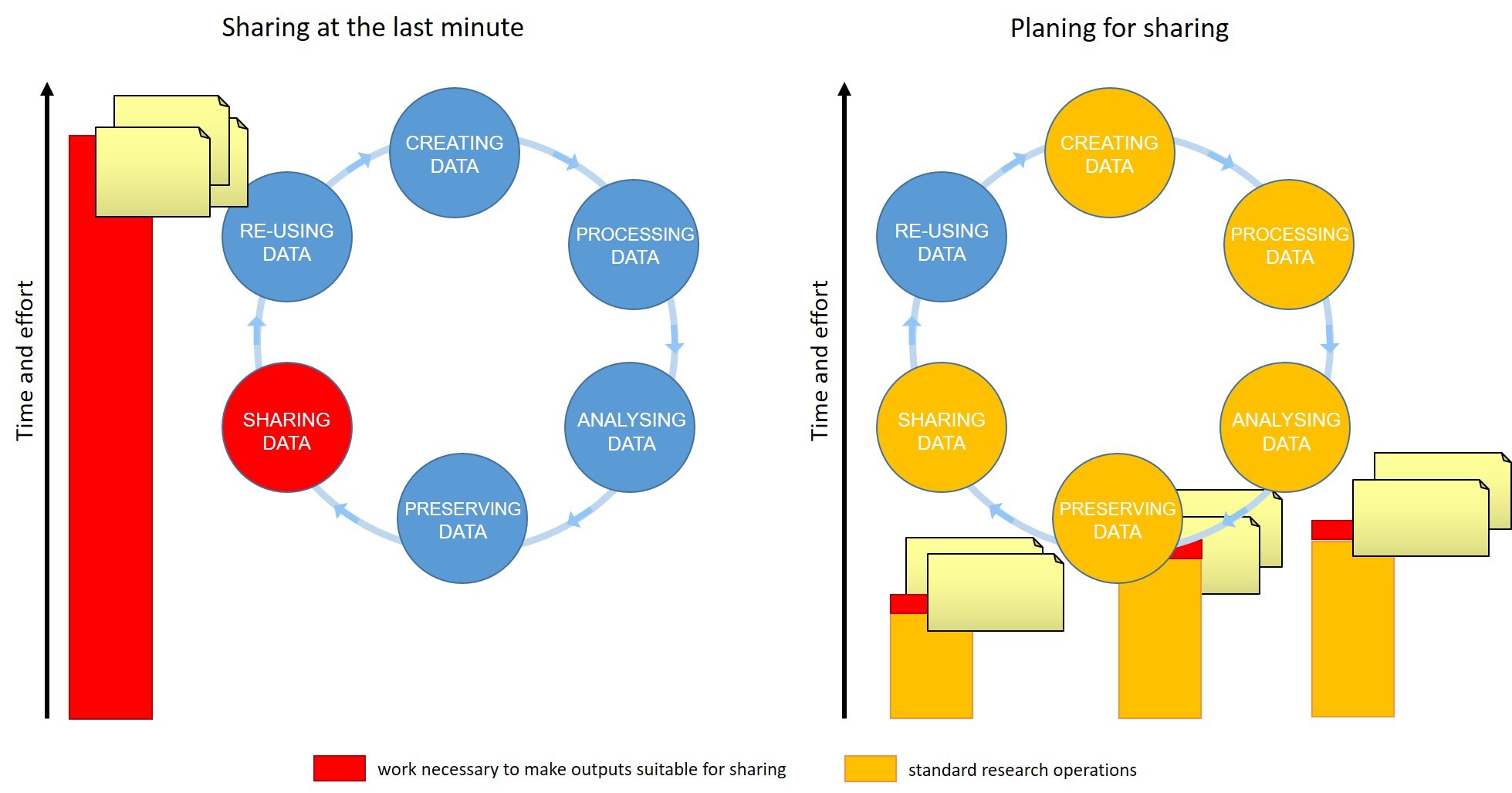Journey to be FAIR
Last updated on 2024-05-01 | Edit this page
Overview
Questions
- What will your journey to be FAIR productive entail?
Objectives
- Discuss steps and changes in your habits you will take after this course
- List of resources that will help you achieve these goals
Better research by better sharing
For many of us, data management or output sharing in general are considered a burden rather than a useful activity. Part of the problem is our bad timing and lack of planning.
Data management is a continuous process
 Figure credits:
Tomasz Zielinski and Andrés Romanowski
Figure credits:
Tomasz Zielinski and Andrés Romanowski
When should you engage in data sharing and open practices?
- Data management should be done throughout the duration of your project.
- If you wait till the end, it will take a massive effort on your side and will be more of a burden than a benefit.
- The overheads of making data suitable for sharing at each stage of data life-cycle are small comparing to the other actions involved
- Taking the time to do effective data management will help you understand your data better and make it easier to find when you need it (for example when you need to write a manuscript or a thesis!).
- All the practices that enable others to access and use your outcomes directly benefit you and your group
Challenge
Exercise 1. Knowledge gap
Read through the following activities / practices, type next to each -1 if you do not perform it ? if you are not completely sure what it stands for 0 if you only learnt about it at this workshop +1 if you adheres / practices it
- Include a license with datasets.
- Include a license with code/scripts.
- Use Git for version control.
- Create DOIs for datasets and code.
- Add a “Date Availability” section to a manuscript.
- Use minimal information standards.
- Use a generic data repository.
- Use a domain-specific data repository.
- Develop description templates for various lab techniques.
- Store data on a shared network drive.
- Implement an automatic backup solution for files.
- Follow a consistent file naming convention.
- Create a standard project folder structure.
- Use electronic lab notebooks.
- Create figures and plots in Python or R.
- Select a data repository.
- Be familiar with non-restrictive licenses.
- Create a README file for each dataset.
- Utilize controlled vocabularies.
- Obtain an ORCID identifier.
- Maintain a dedicated folder or database for protocols and SOPs.
- Establish a system for referencing different versions of protocols.
- Adhere to conventions for tidy data tables.**
- Use Jupyter Notebooks or R Markdown.
- Include PIDs (e.g., UniProt, GenBank) in the data description.
- Use a database for biosamples, strains, etc.
- Grant yourself access to all group data from your personal computer (optional).
- Utilize the data management tools and resources offered by your organization.
- Seek support from your organization for data management.
- Try to find out about all the actions you were not familiar with
- revisit your -1 practices and decide if not to change them to 1
Exercise 1: Your journey to be FAIRproductive
What are the things you are going to change in your work habits, or actions you are going to take after this course?
Some good actions to take:
- For each paper I publish I will make a Zenodo deposit with all the data files
- I will use GitHub for all my code instead of using folders
- I will start using ELNs
- Write a data management plan for my project
- Reorganise my folder structure
- Use templates
- Start using readme files (make a readme template)
- Write protocols on protocols.io
- Back up my data accordingly
- Think as a user of my data instead of just a creator
- Start using Jupyter notebooks, or RMarkdown to describe analysis workflows
- Write intelligible metadata
Resources
The full version of this course: FAIR in (bio) practice
The BioRDM team has a lot of materials on their BioRDM wiki.
Practical recipes and interactive guides:
Finding resources for example repositories or standards
- https://fairsharing.org/
- https://www.re3data.org/
- BioRDM wiki
- There are simple steps to help make your data more FAIR throughout the research data lifecycle
- Implement these steps throughout to keep track of your data and changes
